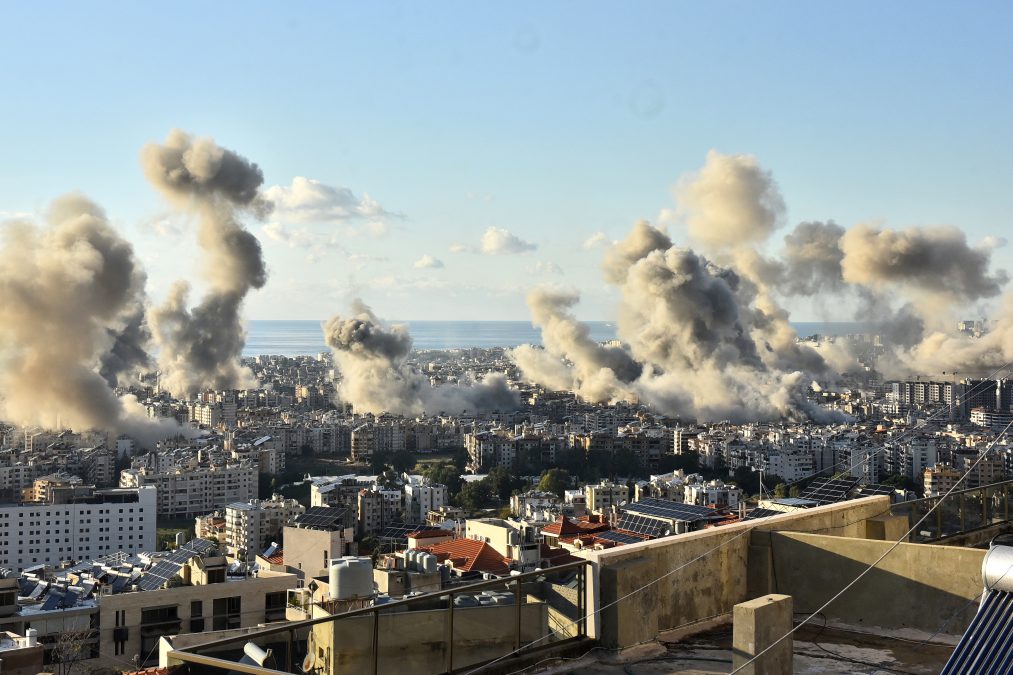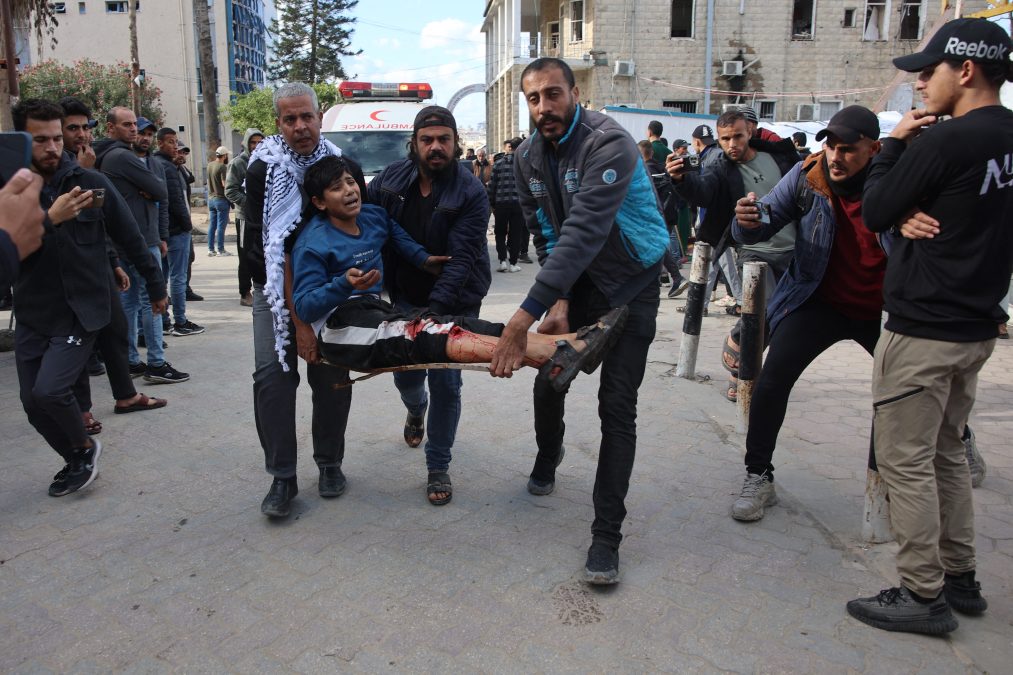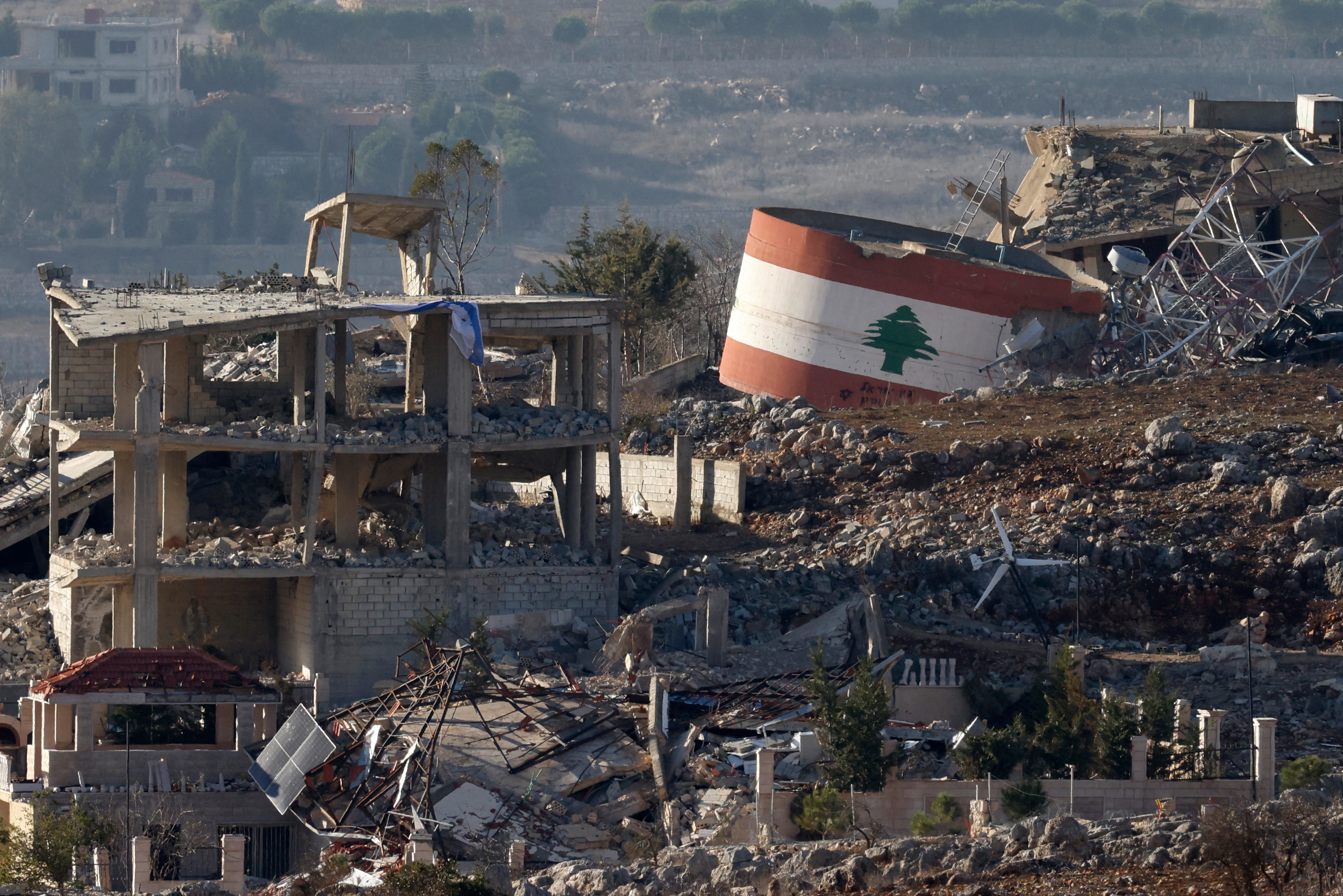Beirut/Jerusalem/Italy — Israeli Prime Minister Benjamin Netanyahu said on Tuesday he would bring a US-brokered proposal for a ceasefire with Hezbollah in Lebanon to his security cabinet for a vote as soon as this evening. In a statement, US President Joe Biden said the 60-day Israeli-Hezbollah ceasefire would take effect on Wednesday (November 27) at 4:00 AM Beirut time or 0200 GMT.
“Citizens of Israel, this evening I will bring a ceasefire outline for the cabinet’s approval,” Netanyahu said in a televised address. “The length of the ceasefire depends on what happens in Lebanon.”
In Beirut, Lebanon’s Prime Minister Najib Mikati demanded in a statement on Tuesday that the international community “act swiftly” to halt Israeli aggression “and implement an immediate ceasefire”.
His comments came after Israeli Prime Minister Benjamin Netanyahu said in an address that his security cabinet would agree “this evening” on a truce deal in its war against the Lebanese militant group Hezbollah.
Mikati said the intense wave of Israeli air strikes on Beirut on Tuesday “reaffirms that the Israeli enemy has no regard for any law or consideration”.
“The international community is called upon to act swiftly to stop this aggression and implement an immediate ceasefire,” he said in his statement, which was issued before a strike hit the central Hamra commercial district.
On the other hand, Netanyahu said Tuesday that a ceasefire with Hezbollah to be adopted in the evening would allow Israel to “intensify” pressure on Hamas and focus on the “Iranian threat”.
“When Hezbollah is out of the picture, Hamas is left alone in the fight. Our pressure on it will intensify,” Netanyahu said, adding that a ceasefire would also enable “focusing on the Iranian threat” and give the military time to resupply.
ATTACKS AGAINST LEBANON
A strike hit a central Beirut shopping district on Tuesday, an AFP journalist said, shortly after Israeli Prime Minister Benjamin Netanyahu said the cabinet would agree to a truce with Hezbollah.
An AFP video journalist saw smoke rising from the targeted building in the normally busy Hamra district, home to residential buildings, restaurants, offices, shops, the American University of Beirut, and its associated hospital.
As the ceasefire looms, Israel has indicated that it wants to inflict maximum damage before the ceasefire deadline sets in. There was a flurry of air strikes hitting central Beirut on Tuesday.
Waves of strikes pounded Beirut after a flurry of Israeli evacuation warnings, AFPTV footage showed, in the heaviest raids since Israel’s air campaign escalated.

Lebanon’s state-run National News Agency said that “a belt of fire has encircled (the city’s) southern suburbs” as raids targeted Burj al-Barajneh, Haret Hreik, and Hadath.
Lebanon’s state-run National News Agency reported that three strikes hit the central Nweiri neighborhood and destroyed a “four-story building housing displaced people”. The health ministry said the first strike killed seven people and wounded 37.
“We were blown away and the walls fell on top of us,” said Rola Jaafar, who lives in the building opposite.
Lebanese lawmaker Amin Sherri, speaking to reporters at the scene of the strike, accused Israel of “seeking revenge on supporters of the resistance [Hezbollah] and on all Lebanese” ahead of a possible ceasefire.
Earlier in the day, the Israeli military claimed it had attacked 20 alleged Hezbollah targets in the Beirut area, including command centers, “weapons storage facilities” and “components of Hezbollah’s financial system”.
It also said it had hit 30 targets in south Lebanon since the morning, and troops had “engaged in close-quarters combat with terrorists” and destroyed hidden weapons caches during ground raids in the Litani River region.
The military later said at least 20 projectiles were identified crossing from Lebanon into Israeli territory. Some of them were intercepted.
PEACE EFFORTS AND ISRAEL
Israel’s security cabinet gathered in Tel Aviv to begin discussing the proposed truce in Lebanon, an official in Prime Minister Benjamin Netanyahu’s office told AFP on Tuesday afternoon.
After the meeting, the prime minister was to issue a public statement, scheduled for 8 pm (1800 GMT), his office said.
The United States and France have spearheaded the truce efforts, and G7 foreign ministers called on Tuesday for an “immediate ceasefire”, saying in a statement: “Now is the time to conclude a diplomatic settlement.”
US news outlet Axios reported that the draft agreement included a 60-day transition period.
During that time, Israeli forces would withdraw, the Lebanese army would deploy along the border and Hezbollah would pull its heavy weapons back north of the Litani River, some 30 kilometers (20 miles) from the frontier, Axios said.
A US-led committee would oversee implementation, with provisions allowing Israel to act against imminent threats if Lebanese forces failed to intervene.
Israeli defense minister Israel Katz told the UN’s Lebanon envoy Tuesday that Israel would have “zero tolerance” when defending its security interests, even after a truce.
“If you do not act, we will do it, forcefully,” Katz told Janine Hennis-Plasschaert during a meeting in Tel Aviv, a statement from his office said.
Israeli media have reported that Netanyahu is likely to endorse the US ceasefire proposal.
Lebanon says at least 3,799 people have been killed in the country since October 2023, most of them in the past several weeks.
On the Israeli side, the hostilities with Hezbollah have killed at least 82 soldiers and 47 civilians, authorities say.
The initial exchanges forced tens of thousands of Israelis from their homes, and Israeli officials have said they are fighting so they can return safely.
Some northern residents questioned whether that would be possible under a ceasefire.
“In my opinion, it would be a serious mistake to sign an agreement as long as Hezbollah has not been completely eliminated,” said Maryam Younnes, 29, a student from Maalot-Tarshiha.
Israel’s far-right National Security Minister Itamar Ben Gvir warned on X that a Lebanon ceasefire would be a “historic missed opportunity to eradicate Hezbollah”.
But EU foreign policy chief Josep Borrell said Israel had “no more excuses” to refuse a deal.
THE GAZA SITUATION
Sustained efforts this year by mediators to secure a truce and hostage-release deal in the Gaza war have failed.
In Gaza, the civil defense agency said Tuesday that 22 people were killed in Israeli shelling and strikes across the Palestinian territory, including 11 killed by a strike on a school housing the displaced.
With the violence showing no signs of stopping, Gazans were left “scavenging among the rubble” for food, said Louise Wateridge, spokeswoman for the UN agency for Palestinian refugees, UNRWA.
Israel’s military campaign has killed 44,249 people in Gaza, according to the United Nations.
“At least 11 Palestinians were killed and more than 40 injured in an Israeli air strike that targeted Al-Hurriya School, which houses thousands of displaced people,” said an official.

Palestinian group Hamas condemned the strike as a “new crime”.
Earlier on Tuesday, the agency said 11 people were killed in overnight Israeli air strikes and shelling.
In the northern city of Jabalia, seven people were killed and several wounded in an air strike on a residential building, civil defense spokesman Mahmud Bassal told AFP.
Another person was killed in a strike on a house in nearby Beit Lahia, which along with Jabalia has been the focus of a major Israeli military operation since October 6.
Two people were killed in shelling of Nuseirat camp in central Gaza, Bassal said. In the southern city of Rafah, an air strike killed one person and wounded several, he added.
G7 AND NETANYAHU’S ARREST WARRANT
In Fiuggi, Italy, G7 foreign ministers said Tuesday they “will comply with our respective obligations” regarding the arrest warrant for Israeli Prime Minister Benjamin Netanyahu issued by the International Criminal Court (ICC).
The Group of Seven industrialized nations brings together Britain, Canada, Germany, France, Japan, host Italy, and the United States.
“We reiterate our commitment to International Humanitarian Law and will comply with our respective obligations,” the ministers said in a joint statement issued following two days of talks near Rome.
The ICC issued an arrest warrant for Netanyahu last week, prompting outrage from Israel and its allies — including the US, which is not a member of the ICC and has rejected its jurisdiction.
All of the other G7 countries are members of the ICC — meaning they would have to arrest Netanyahu if he traveled there.
The ICC also issued warrants for Netanyahu’s former defense minister and for Hamas’s military chief Mohammed Deif, whom Israel claimed was killed in an air strike in Gaza in July. Hamas has not confirmed his death.
The G7 statement said the foreign ministers “underline that there can be no equivalence between the terrorist group Hamas and the State of Israel”.
“In exercising its right to defend itself, Israel must fully comply with its obligations under international law in all circumstances, including International Humanitarian Law,” the statement said.
The Hague-based ICC says the warrants for Netanyahu and his former minister were “for crimes against humanity and war crimes committed from at least 8 October 2023 until at least 20 May 2024”.
Italy had asked for a discussion on the ICC warrants at the G7, after apparent splits within Prime Minister Giorgia Meloni’s government over what it meant for Netanyahu.
A diplomatic source said the discussion in Fiuggi was “much broader and more strategic” than what ended up in the final statement, without revealing details.
“We found a common position that was what we had asked for,” Italian Foreign Minister Antonio Tajani told a press conference after the talks.
He said there were “many legal doubts” regarding the warrant, saying “we need to understand the rules”.
“Can a head of state be arrested? Who is going to arrest him?” he asked.
“Netanyahu will never go to a country where he could be arrested,” he added.
Earlier in Italy, the US Secretary of State Antony Blinken had said that efforts to secure a ceasefire in Lebanon were “in the final stages”, and that a deal could help end the Gaza conflict.
“We’re not there yet, but I believe we are in the final stages,” Blinken told reporters after a meeting near Rome with G7 counterparts, adding that “by de-escalating tensions in the region, it can also help us to end the conflict in Gaza”.
He was speaking as Israel’s security cabinet convened to discuss a proposed ceasefire in its war with Hezbollah in Lebanon, as a flurry of air strikes hit central Beirut.
Blinken said that after months of “intensive diplomatic effort” with partners including France, working with Lebanon and Israel, he hoped to reach a conclusion “very soon”.
“It will make a big difference in saving lives and livelihoods in Lebanon and in Israel. It will make a big difference in creating the conditions that will allow people to return to their home safely in northern Israel and in southern Lebanon,” he said.
“And I also believe that by de-escalating tensions in the region, it can also help us to end the conflict in Gaza in particular.”
“Hamas will know that it can’t count on other fronts opening up in the war. So we’re tracking this very closely, and I hope and believe that we can get this over the finish line.”
Hosts Italy had invited ministers from several Arab nations to the talks in Fiuggi, in the Lazio region around Rome, from Saudi Arabia and Egypt to Jordan, the United Arab Emirates and Qatar.
The Middle East dominated the first day of the two-day meeting, and Blinken said they had discussed how to “lay the foundation for a more durable peace now that Israel has achieved its strategic goals in the wake of October 7th (the Hamas attack on Israel) in Gaza”.
“We agreed with our partners that we cannot end the conflict without a plan for the post-conflict, something that we’re working on intensely,” the US diplomat added.

